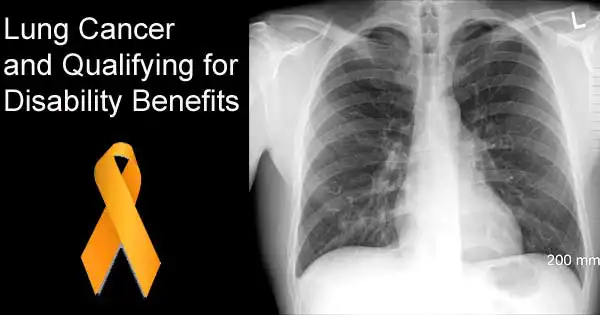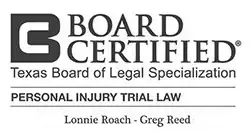Can I get Disability for Lung Cancer? – Lawyer Advice
Can I get disability benefits if I am suffering from the effects of Lung Cancer?
Author: Attorney Lloyd Bemis
Updated: 10/25/2024
Summary: Can I get disability benefits if I am suffering from the effects of Lung Cancer?
First you must meet the SSA’s financial requirement: You must have worked long enough, recently enough, and not made over a predetermined level of income.
Second you must meet the medical requirements:
In order to be approved under this listing, an applicant must show evidence of the following:
- Non-small-cell carcinoma that is inoperable, unresectable, recurrent, or spread to or beyond the hilar lymph nodes.
OR
- Small-cell carcinoma.
OR
- Carcinoma of the superior sulcus that has undergone more than one type of treatment; for example, surgery and chemotherapy.
In order to qualify for Social Security Disability Income, an applicant should provide detailed medical evidence confirming a diagnosis of lung cancer.
SCLC is a compassionate allowance condition which means the SSA will expedite the application for disability benefits.
OR
OR
Lung cancer is the leading cause of cancer death among men and women in the United States. Though the American Cancer Society predicts there will be 235,760 new cases of lung cancer this year, the number of new lung cancer cases continues to decrease as people quit smoking and due to early detection and treatment. If you are suffering from the effects of Lung Cancer you may qualify for disability benefits.

If you have been diagnosed with a form of lung cancer, you may be eligible to receive Social Security Disability Insurance (SSDI) benefits.
The lungs are two organs in the chest that take in oxygen when a person inhales and release carbon dioxide as a person exhales.
When a person breathes, air enters the mouth and nose and passes through the trachea, or windpipe, which is divided into tubes called bronchi. The bronchi divide into small branches called bronchioles, at the ends of which are tiny air sacs called alveoli. Alveoli absorb oxygen into the blood and remove carbon dioxide when a person exhales. Lung cancers usually start in the cells lining the bronchi, bronchioles and alveoli.
Symptoms of lung cancer are usually not apparent in the disease’s early stages, typically occurring when the disease has reached an advanced stage.
Symptoms include:
- Shortness of breath;
- A cough that doesn’t go away;
- Chest pain;
- Coughing up blood
- Hoarseness;
- Bone pain;
- Weight loss;
- Headache.
Any of these symptoms can affect your ability to maintain employment.
Any of the following treatments, alone or in combination with other therapies, may be advised.
- Surgery to remove the lung cancer;
- Chemotherapy to kill cancer cells;
- Targeted drug therapy that focuses on specific abnormalities in cancer cells;
- Immunotherapy that uses the immune system to fight cancer;
- Stereotactic body radiotherapy, an intense radiation therapy.
Following the treatment plan laid out by your doctor is essential for qualifying for disability benefits.
Qualifying for Disability for Lung Cancer
Lung cancer is acknowledged as a disabling impairment in Social Security’s Blue Book under Section 13.14.
In order to be approved under this listing, an applicant must show evidence of the following:
- Non-small-cell carcinoma that is inoperable, unresectable (not all of the cancer tissue was removed during surgery), recurrent, or spread to or beyond the hilar lymph nodes. The hilar lymph nodes are located where lymphatic vessels, arteries and veins enter the lungs.
OR - Small-cell (also called oat cell) carcinoma.
- Carcinoma of the superior sulcus (located at the apex of the lungs) that has undergone more than one type of treatment; for example, surgery and chemotherapy. This is also called a Pancoast tumor.
OR
In order to qualify for Social Security Disability Income, an applicant should provide detailed medical evidence confirming a diagnosis of lung cancer, including:
- A doctor’s diagnosis that includes the results of a biopsy of a primary tumor(s);
- Pathology report(s) of tissue samples;
- Documentation of metastatic tumors; and
- Surgery reports and reports of tissue removed.
A simple diagnosis of a small cell carcinoma can automatically qualify for Social Security disability benefits.
SCLC is a compassionate allowance condition. Social Security will expedite the application for disability benefits, provided the diagnosis and medical records support the diagnosis and the applicant meets Social Security’s non-medical requirements. Severe cases of NSCLC are also considered compassionate allowance conditions.
If you have lung cancer, yet your disability does not match Social Security’s listing, you may still be eligible for Social Security Disability benefits.
Many people with lung cancer also have emphysema or chronic bronchitis. Applicants often have more than one illness or injury that prevents them from working full time. By itself lung cancer may not meet the requirements of the listing as stated in Social Security’s Blue Book, but if an applicant has multiple medical conditions, Social Security must consider how those health issues, combined together, limit an applicant’s ability to hold a job and perform necessary daily tasks. Social Security will conduct a residual functional capacity assessment (RFC) to evaluate your abilities and limitations to determine if you are capable of performing your prior job or any other type of work. The SSA will consider your medical records and doctors’ statements of how symptoms limit your ability to function, as well as long-term side effects of cancer treatment.
Treatments for lung cancer are debilitating and unpleasant and can make it impossible for anyone to work.
If you have lung cancer and are unable to work, you may qualify for Social Security Disability income. You should file your claim as soon as possible and include all medical information available to avoid delay, especially written statements from your medical providers. Some compassionate allowance cases are denied because of a lack of medical evidence or an improperly submitted application. An experienced Social Security disability attorney can help you gather the proper information you need and avoid mistakes in filing your claim.
In order to qualify for Social Security Disability, you will need to satisfy a few specific requirements in two categories as determined by the Social Security Administration.
The first category is the Work Requirements which has two tests.
- The Duration of Work test. Whether you have worked long enough to be covered under SSDI.
- The Current Work Test. Whether you worked recently enough for the work to actually count toward coverage.
The second category is the Medical Eligibility Requirement.
- Are you working? Your disability must be “total”.
- Is your medical condition severe? Your disability must be “severe” enough to interfere with your ability to perform basic work-related activities, such as walking, sitting, and remembering.
- Is your medical condition on the List of Impairments? The SSA has a “List of Impairments” that automatically qualify as “severe” disabilities. If your disease is not listed this does not mean you cannot get disability, it means you must prove you cannot maintain employment due to your limitations.
- Can you do the work you did before? SSDI rules look at whether your medical condition prevents you from doing the work you did prior to developing the condition.
- Can you do any other type of work? If you cannot do your prior work, an evaluation is made as to whether you can perform any other kind of work.
More details can be found on our Qualifying for Disability page.
Disability benefits are an important source of income for those who are unable to work. If you are not able to work due to accident or illness, you may be eligible for Social Security Disability or Long Term Disability benefits. If you have applied for benefits and been denied, contact the attorneys at Bemis, Roach and Reed for a free consultation. Call 512-454-4000 and get help NOW.
Cancer and Qualifying for SS Disability Benefits – A Lawyer’s Advice
Bronchiectasis and Qualifying for SS Disability Benefits
Can I get Social Security Disability for Throat Cancer?


Your Free Initial Consultation
Call now:
At Bemis, Roach and Reed, if we can't help you, we will try to find the right attorneys for you.
We offer each of our prospective clients a free no obligation one hour phone or office consultation to see if we can help you and if you are comfortable with us. We know how difficult a time like this can be and how hard the decisions are. If we can be of assistance to you and help you find a solution to your issue we will, even if that means referring you to another attorney.
Let's get you Started:
If you could provide us with some basic information about your claim we will get right back with you with a free case evaluation and schedule your Free Consultation Today.
You can also email us at: contact@brrlaw.com
Kind Words from Our Clients
“The attorneys and staff at Bemis, Roach & Reed have provided me and my husband, Jeff, with stellar advice, care, and service. They made navigating the SSDI process easy, painless, and as timely as possible. During this difficult time in our lives it was a tremendous relief to know they were on our side and keeping us updated on next steps and timelines. We also had questions about my husband’s long term disability insurance and they helped us get those questions answered and resolved without any additional fee. I highly recommend Bemis, Roach & Reed.” – Kelli G
“I needed a lawyer for my case and had googled best lawyers. They came up first on my list and decided to give them a call. From the moment I called I knew I chose the right people. They said they would fight for me and fight they did. They knew what they were doing and kept good communication throughout the process. If you need someone that will listen, understand, and fight then these are the people. HIGHLY RECOMMEND.” – Marcel L.
“I’ve had a great experience working with Bemis, Roach & Reed for my disability case. I spent two years fighting on my own, until I was informed to look for a disability lawyer. Right away, sending in questions was a breeze, and from the moment my case was accepted, everything became a major weight off my shoulders. My newest appeal was filed for me, my medical records and case history sorted for me, and I could finally focus on my appointments and treatment with a little less worry. Everything was explained to me in a way that made sense, the process was set out in an easy to understand way. And, just like that, at the beginning of July 2023, my claim was accepted!” – Sunshinemutt







